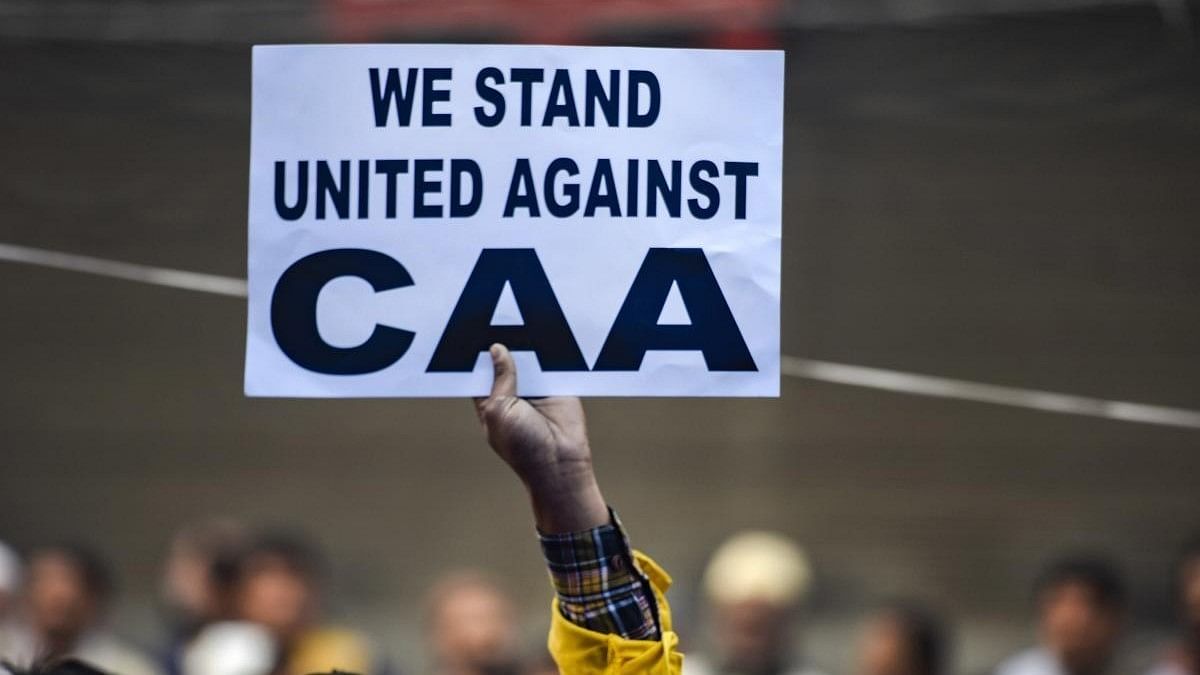
A protestor holds a placard during a demonstration against the Citizenship Amendment Act (CAA).
Credit: PTI File Photo
Bongaon: In the tranquil village of Purba Jaynagar in Bongaon, nestled near the Bangladesh border, a palpable sense of disillusionment fills the atmosphere within the Matua community over CAA.
Seated outside his modest thatched-roof home in the village, 60-year-old Srikanta Sarkar reflects on his dream of a permanent homeland, free from persecution and discrimination — a hope that was briefly rekindled by the implementation of the Citizenship Amendment Act (CAA) in March.
However, his dream was swiftly dashed as complexities of the citizenship application process unfolded, demanding proof of residency in Bangladesh, a requirement Sarkar finds impossible to fulfil.
''We have waited decades for citizenship after fleeing religious persecution in Satkhira, Bangladesh. But now, the CAA demands documents we don't possess,'' Sarkar told PTI.
This sentiment resonates deeply within the Matua community and other refugees residing in Bongaon constituency.
Despite CAA's implementation two months ago, complexities surrounding the Act persist, leaving many Matuas hesitant to apply online.
The Matuas, known for their support of the CAA, currently voice discontent and unease over the need to provide documents disclosing their previous Bangladeshi nationality during application.
They argue that this undermines the Act's core purpose and advocate for a revision of its rules.
Lipton Ray, another Matua community member, said, ''Where will we get documents proving our citizenship in Bangladesh? Our parents fled with nothing but the clothes they wore.''
''The government should issue a new notification with revised rules that eliminate the need for such documents for persecuted people like us,'' he said.
The CAA, enacted in March, aims to grant Indian nationality to persecuted non-Muslim migrants from Pakistan, Bangladesh, and Afghanistan who arrived in India before December 31, 2014.
However, applicants must provide specific documents, such as passports or birth certificates, to establish their nationality, a requirement that poses a significant challenge for the Matua community and other refugees.
The Matuas are a formidable voting bloc that can significantly influence political fortunes in at least five Lok Sabha constituencies. Followers of Vaishnavite Namasudra sect, Matuas began migrating to West Bengal during the Partition and in large numbers after the 1971 Bangladesh Liberation War due to religious persecution.
For generations, Matuas held onto their dreams of finding a safe haven, free from persecution and discrimination. When CAA was introduced, it appeared to signal a new beginning, offering hope for citizenship and acceptance.
However, as the dust settled and reality set in, euphoria gave way to confusion, disappointment, and apprehension as the complexities of the citizenship application process unfolded.
Ray, once a fervent supporter of the Act, now finds himself disillusioned by bureaucratic hurdles and unanswered questions.
"It seems that the very purpose of the CAA is being defeated because of this documentation clause," Ray remarked.
The Matuas believe that the CAA, in its current form, has placed them in a catch-22 situation, as the majority either arrived without documents from Bangladesh or discarded them after obtaining some documents in India.
''We want the government to issue a fresh notification granting us citizenship solely based on our religion and our declaration. The problem with this new law is that once you apply, you will be identified as a foreigner and lose all benefits if you don't have documents from Bangladesh,'' said Rekha Biswas, a resident of Sayestanagar in Bongaon.
Mahitosh Baidya, the general secretary of the All India Matua Mahasangha, echoed these sentiments, stating that until the documentation problems are addressed, few Matuas are likely to apply for citizenship under the CAA.
''The CAA, in its present form, is having a slow death as hardly anyone from Bongaon is applying for it because of the clause requiring documents from Bangladesh. Until this clause is removed, none of the Matuas are likely to apply for it,'' he told PTI.
The All India Matua Mahasangha has advised its members to abstain from submitting citizenship applications due to a lack of necessary documents proving their previous residential addresses in Bangladesh.
Despite the challenges, political parties continue to court the support of the Matua community, recognizing its significant voting bloc.
Sensing a drift among the community, BJP MLA from Matua-dominated Haringhata, Asim Sarkar, had said people have been advised to wait until the rules are simplified.
''We have informed our top leadership, both in the government and the party, about the challenges Matua community members are encountering, with the portal requiring documents proving their Bangladeshi origin. Thus, we have advised them not to panic and await the simplification of rules,'' he said.
The promise of implementing the controversial CAA was a major electoral platform for the BJP in the last Lok Sabha elections in West Bengal, which the saffron party's leaders believe played a significant role in its ascendancy in the state by winning 18 out of the 42 Lok Sabha seats, including the Bongaon segment, in 2019.
Matuas constitute around 70 per cent of the approximately 19 lakh electorate of Bongaon, an SC-reserved seat, making them the deciding factor in the constituency.
TMC candidate from Bongaon seat Biswajit Das said, ''The hoax of CAA is now out in the open. Matuas have realised how they have been fooled by the BJP.''
The community, with an estimated population of three million in the state, can tilt the scales in favour of a political party in at least four Lok Sabha seats spread across Nadia and North 24 Parganas districts bordering Bangladesh.
Since the '90s, political parties have sought the support of Matuas, whose substantial population and tendency to vote cohesively render them a valuable voting bloc akin to minority groups. The constituency will go to polls on May 20 in the fifth phase.